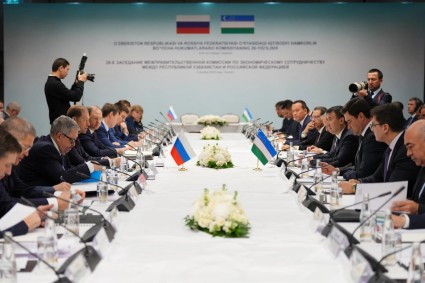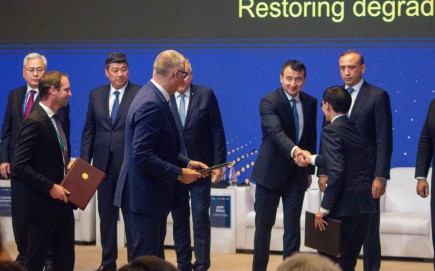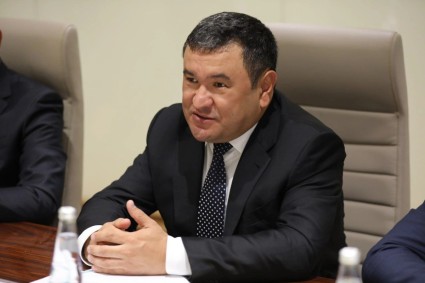Tashkent hosted a workshop focusing on the issues of introduction of international standard for energy management at Uzbekistan’s industrial enterprises. It was jointly organized by the World Bank and the Ministry of Economy.
The event was attended by over 50 participants representing ministries and state agencies, large industrial enterprises, state companies from power, oil and gas, automotive, chemical, construction materials production, railway, cotton and light industries, as well as research and academic institutes.
The industrial sector is the second largest energy end user, after the residential sector, and accounts for about 25% of total final energy consumption in Uzbekistan. The large presence of energy-intensive industries, obsolete production processes, inefficient equipment, and a general lack of systematic monitoring and control of energy use in industrial facilities have a major contributing factor to the high energy-intensity of the domestic economy.
Using energy efficiently helps organizations save money as well as helping to conserve resources and tackle climate change. ISO 50001 supports organizations in all sectors to use energy more efficiently, through the implementation of an energy management system (EnMS). EnMS was formally endorsed by the government in May 2015 through the Presidential Decree No. PP-2343. Since then 24 enterprises have been certified in accordance with ISO 50001.
With the support of the Korean Green Growth Trust Fund (KGGTF), the World Bank and the Ministry of Economy launched the Pilot Program on Implementation of EnMs in March 2016. It is a part of the World Bank’s industrial energy efficiency assistance program.
The main objectives of the Pilot Program were to support broader adoption of EnMS by adapting international best practices in Uzbekistan, using tested methods: (1) a practical EnMS implementation guidance book; and (2) training of local specialists for EnMS implementation support.
The Pilot Program focused on guiding flagship companies in energy intensive sectors to implement formal EnMS. As a result, JSC “Bekabadcement” and JSC “Quizilcumsement” became the first companies in the cement sector, and JSC “Kattakurgan yog’-moy” the first company in the edible oil sector, to implement formal EnMS certified to ISO50001. Their experience is now being replicated in other enterprises.
“The efforts the Government is making to reduce energy intensity is commendable. The World Bank has been supporting the efforts of the Government in decreasing energy intensity through US$275 million projects financed by the Bank and focusing on improvement of energy efficiency of local industrial enterprises and modernization of the power transmission networks in Uzbekistan. We are glad that the Pilot Program contributes to this goal through introducing EnMS at the domestic enterprises in pursuance of the Presidential Decree ‘On Program of Measures to Increase Energy Efficiency and Introduce Energy-Saving Technologies in the Sectors of Economy and Social Sphere in 2015-2019,” says Feng Liu, Senior Energy Specialist, World Bank.
During the Workshop on EnMS in Tashkent the World Bank experts and representatives of industrial enterprises involved in the Pilot Program informed the event participants about results that were achieved after introducing EnMs, as well as the lessons learned from the implementation process.
In 2016, JSC “Bekabadcement” became one of the first participants that joined the Pilot Program, having introduced EnMs at the enterprise after their staff underwent special trainings and developed plan of actions. JSC “Bekabadcement” representatives shared their experience with the workshop participants.
The management of one of the oldest cement producers in Uzbekistan with annual production capacity of over 1.5 million tons of cement have prioritized increased energy efficiency, rational use of energy, and increased energy savings through continuous improvement of production processes. In order to achieve these tasks more efficiently JSC “Bekabadcement” decided to create and implement an EnMS in accordance with the requirements of ISO 50001. The implementation of EnMS, together with modernization investments helped the enterprise achieve reduction in gas and electricity consumption by 26% and 2%, respectively.
The event participants discussed international best practices, having considered experience of the US and Chin–∞’s enterprises in the area of EnMS. They also had an exchange on further development of the national industrial energy management policy in Uzbekistan.
In Uzbekistan, the World Bank currently supports implementation of 16 projects, which are worth of around US$2 billion. Those projects cover such priority areas as agriculture and water resources management, energy, transport, healthcare, education, urban development, water supply and sanitation.












